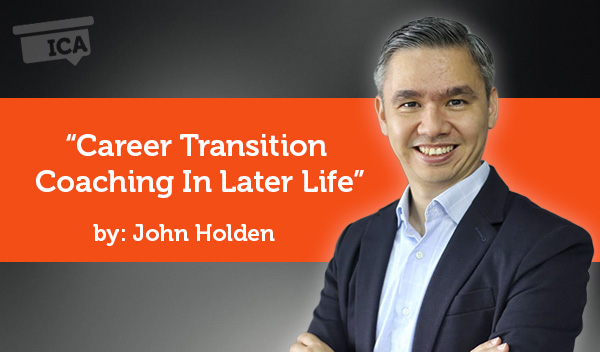
Research Paper By John Holden
(Executive Coach, SINGAPORE)
According to the World Health Statistics report in 2017 by the World Health Organisation (WHO), Singapore ranked third in the world for average life expectancy, just behind Japan and Switzerland. The average life expectancy in Singapore was 83.1 years. In this island-state city, the general population could be living on average a good 20 years more after the current retirement age of 62. As long as people are in good health, with a modest sustainable income source, and purpose & meaning in what we’ll be doing. We can be working into their 60s, 70s, even early 80s. I have just turned 40 years old this year heading into mid-life/mid-career transition, and the thought of having to work beyond the normal retirement age of 62 is becoming a reality for myself and my peer group.
Many of my career coaching clients are in their 30s and 40s seeking career growth and development or mid-career transitions. Increasingly, I’m having clients who are in theirs late 40s, 50s, early 60s seeking for second careers, third careers, even fourth careers. Recently, I worked with a Singaporean client in his mid-50s. And he was considering relocating from Singapore to London with his wife and 2 sons in order to take up, in his own words, “a more challenging and exciting career in the rapidly growing field of Artificial Intelligence (AI).
Executives in their late 40s, 50s and beyond, embarking on a “new” career path later in life are often seeking for more purposeful and meaningful work, perhaps after many years of feeling stuck or not as engaged anymore in certain corporate roles. There are some who are made redundant or being redeployed after organization restructuring or streamlining exercises. The challenges that they face could be:
Typically, in my Career Transition Coaching Program, the following coaching skills and techniques will be used:
First of all, I would work with the client on their confidence, self-esteem. Exploring with them each having more than 20-30 years of work experience under their belt, age seniority could potentially be their strength rather than weakness. I would encourage them to gather key insights and discuss their Strengths, Key Successes, Conscious/ unconscious values and motivations in their career journey thus far, before moving into the development areas, blind spots that they may have in order to be successful in the new career.
Secondly, I would explore with them their career narratives, their career story. Again with 20-30 years of experience under their belts, what are their Top 3-5 Core Skills and Competencies that would be beneficial to their new career path.
Thirdly, for people of all ages, not just for older executives, there is merit in clarifying the personal and organizational vision and objectives during the first few months of the career transition. And at the same time, having something like a First 90 days plan in the areas of success factors, key challenges, new identity and style, new approaches, forming new networks and connections, capabilities and upskilling.
In my numerous conversations with multinational companies and human resources professionals in Asia, my research shows that employers can do more for executives seeking career transitions in later lives. One of the the key objectives of the employer must be for the hired employee, in this case the older executives to succeed in the role, deliver value and results for the company, and to have some longevity in the role. Therefore, the On-boarding process would be crucial, and this could be customized or tailored for different age groups– to alleviate some of the anxieties mentioned earlier on that are more associated with older executives. This could be a series of company on-boarding workshops focusing on company culture, company structure, key success criteria, Skills training, and very importantly a buddy system or mentor system for the initial transition period.
Some companies developed ‘Returnship Programs’ for people who are looking to restart their careers after an extended absence from the workforce. They offer guided period of exploration for the participant in various business functions, with an opportunity to sharpen their skills in a work environment that may be changing rapidly and significantly. This gives participants the ability to explore a new area of expertise and learn new skills. Perhaps some elements can be considered by employers looking for ways to help older executives into their new careers.
Finally, in my research study, I have some reflections on the topic of Retirement. This is the so called ‘Golden Age’ of our lives, the retirement age, is not only about money or financial income, and it shouldn’t be. From adultdevelopment theories describing different life stages. The child psychologist Erik Erikson developed a theory of Life Cycle Transitions with the last stage being late adulthood for people in their 70s and 80s. The psychologist Daniel Levinson (Levinson, 1978) described “The Seasons of a Man’s Life” through alternating cycles of stability and transition. Another psychologist, Robert Kegan (Kegan, 1982) argued that meaning-making is a lifelong activity that begins in earliest infancy and continues to evolve through a series of stages encompassing childhood, adolescence, and adulthood. There can be many meaningful and purposeful activities for Late Adulthood and Retirement including: